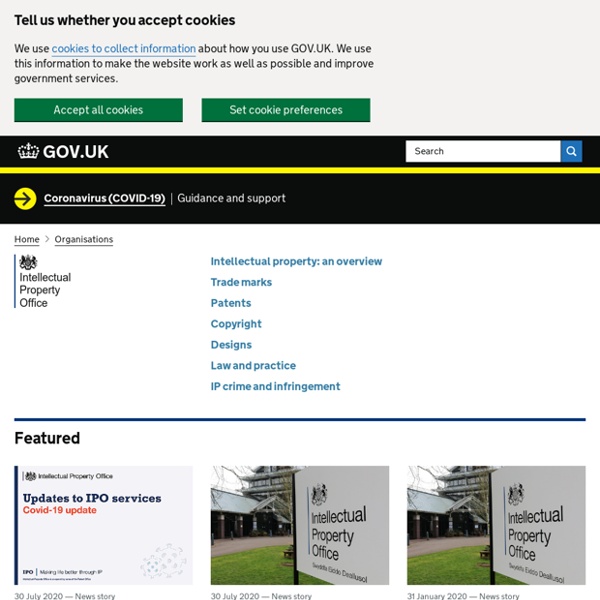



https://www.gov.uk/government/organisations/intellectual-property-office
Related: Unit 4 Assignment 1 • LegislationIntellectual property categories explained - Startups.co.uk: Starting a business advice and business ideas by Philip Eagle Updated: Apr 1, 2014 Published: Apr 26, 2013 An understanding of intellectual property and its protection is vital for anyone with a business idea. Experience tells us that bad intellectual property can make or break a successful business before it’s even started, so protect your idea from the offset.
GDPR Penalties and Fines GDPR penalties and fines The GDPR (General Data Protection Regulation) sets a maximum fine of €20 million (about £18 million) or 4% of annual global turnover – whichever is greater – for infringements. However, not all GDPR infringements lead to data protection fines. Supervisory authorities such as the UK’s ICO (Information Commissioner’s Office) can take a range of other actions, including: Issuing warnings and reprimands; Imposing a temporary or permanent ban on data processing; Ordering the rectification, restriction or erasure of data; and Suspending data transfers to third countries.
World Intellectual Property Organization The World Intellectual Property Organization (WIPO) is the global forum for intellectual property services, policy, information and cooperation. WIPO Translate WIPO has developed a ground-breaking new “artificial intelligence”-based translation tool for patent documents. WIPO Translate is free of charge and available through the PATENTSCOPE database. File, manage or search patents, trademarks, designs and appellations of origin. Copyright Copyright protects written, theatrical, musical and artistic works as well as film, book layouts, sound recordings, and broadcasts. Copyright is an automatic right, which means you don't have to apply for it. About copyright Here you'll find information on the benefits of copyright protection and what an owner's exclusive economic rights are. Copyright applies to... Copyright applies to all sorts of written and recorded materials from software and the internet to drawings and photography.
Patenting your invention You can use a patent to protect your invention. It gives you the right to take legal action against anyone who makes, uses, sells or imports it without your permission. To be granted a patent, your invention must be all of the following: something that can be made or used new inventive - not just a simple modification to something that already exists Patents are expensive and difficult to get. Intellectual property: Copyright, trademarks and patents Intellectual property (or IP) refers to creative work which can be treated as an asset or physical property. Intellectual property rights fall principally into four main areas; copyright, trademarks, design rights and patents. Copyright Copyright applies to work that is recorded in some way; rights exist in items such as literary, artistic, musical and dramatic work as well as films, sound recordings and typographical arrangements.
DPA - The Principles At a glance The GDPR sets out seven key principles: Lawfulness, fairness and transparencyPurpose limitationData minimisationAccuracyStorage limitationIntegrity and confidentiality (security)AccountabilityThese principles should lie at the heart of your approach to processing personal data. In brief What’s new under the GDPR? The principles are broadly similar to the principles in the Data Protection Act 1998 (the 1998 Act).
IP for free_NSW_Glasgow Australian universities are being encouraged to make their intellectual property available for free, after the University of NSW said it will offer IP licences to entrepreneurs at no charge. In a bid to stimulate the take-up of technology, UNSW will offer IP licences for a range of ideas and research results to entrepreneurs and companies at no cost. Licences will need to disclose how the information will be commercialised.
Before you apply for a patent To get the most benefit from a patent, you need a business plan for making money from it. If only a few people will buy your invention, the cost of getting and keeping a granted patent could be more than the money you will make. You also need to ensure you have the finances available to defend it against copying. The Intellectual Property Office (IPO) can’t help you enforce your patent. It is your responsibility to do this and ensure it is properly protected.
What is Intellectual Property? Intellectual property (IP) refers to creations of the mind, such as inventions; literary and artistic works; designs; and symbols, names and images used in commerce. IP is protected in law by, for example, patents, copyright and trademarks, which enable people to earn recognition or financial benefit from what they invent or create. By striking the right balance between the interests of innovators and the wider public interest, the IP system aims to foster an environment in which creativity and innovation can flourish.